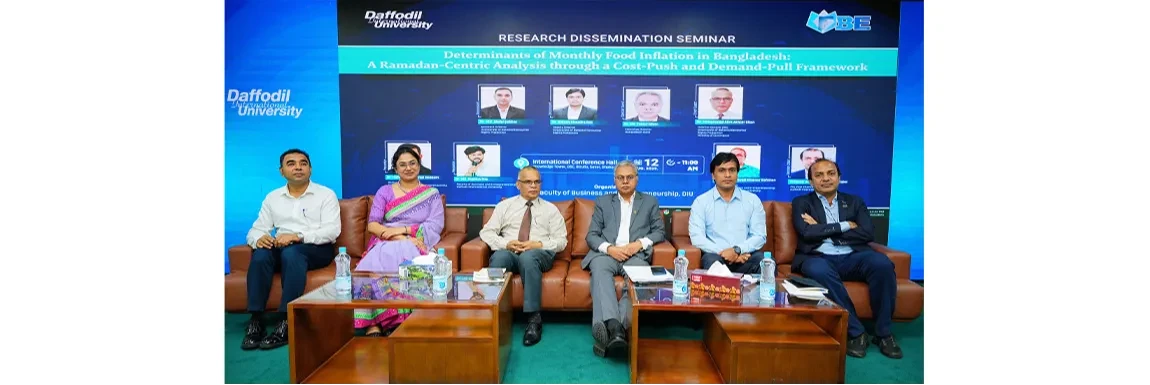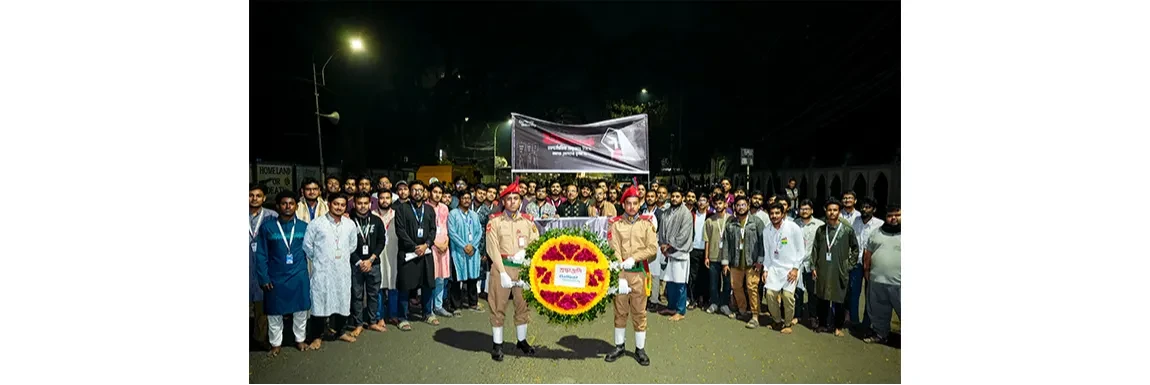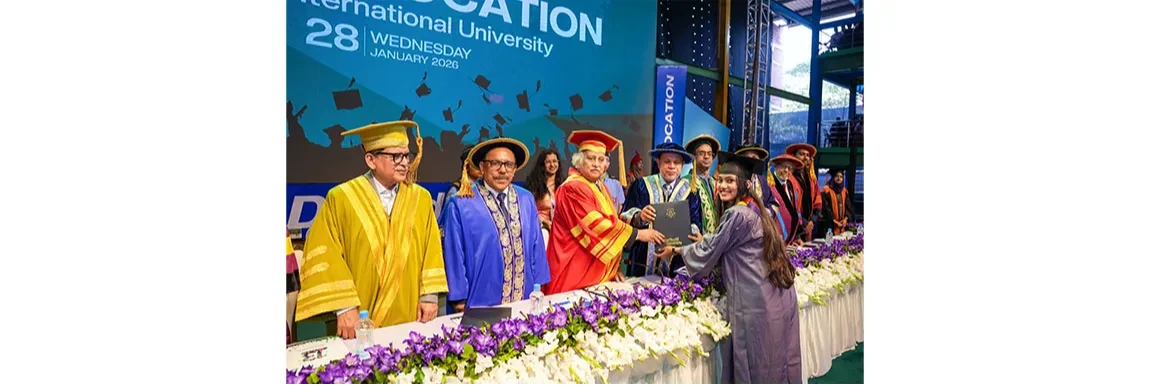Daffodil International University Seminar Calls for Coordinated Action to Tackle Food Inflation

Mohammad Alim Akhtar Khan, Director General of Directorate of National Consumer Rights Protection, Dr. Md. Ezazul Islam, Executive Director Bangladesh Bank, Professor Dr. Mohammad Masum Iqbal., Pro Vice Chancellor of Daffodil International University along with other distinguished guests at the seminar on “Determinants of Monthly Food Inflation in Bangladesh: Ramadan-Centric Analysis through a cost-push and demand-Pull Frame work” held at Daffodil International University.
Dhaka, August 12, 2025:
Rising food prices have emerged as a critical challenge for Bangladesh, where household budgets remain vulnerable to fluctuations in essential commodity prices. To address this pressing issue, Daffodil International University's Faculty of Business and Entrepreneurship hosted a research seminar on August 12, 2025, focusing on the drivers of food inflation during Ramadan and proposing policy measures to stabilize markets. The seminar, titled "Monthly Food Inflation in Bangladesh: A Ramadan-Centric Analysis through a Cost-Push and Demand-Pull Framework," brought together economists, policymakers, and students to discuss the structural and behavioral factors behind price surges. Professor Dr. Syed Mizanur Rahman, Associate Dean of the Faculty of Business and Entrepreneurship, opened the event by highlighting the growing concern of "shrinkflation," where consumers receive reduced quantities for the same price, a subtle yet damaging form of market manipulation.
Dr. Mohammad Reyad Hossain, Assistant Professor at the university, presented key findings from the research, identifying currency depreciation, global food price volatility, and supply chain disruptions as major cost-push factors. On the demand side, panic buying, hoarding, and speculative trading ahead of Ramadan exacerbate price hikes. The study emphasized that proactive measures, such as accelerating food imports three to four months before Ramadan, could mitigate these effects. Stabilizing the exchange rate, streamlining port operations, and reducing bureaucratic delays were also highlighted as critical steps to ensure timely availability of essential goods. The discussion then turned to market interventions, with researchers advocating for expanded Open Market Sales (OMS) of subsidized staples like rice, wheat, and lentils, particularly in urban slums and rural areas facing shortages. Strengthening market monitoring to curb hoarding and implementing temporary tariff cuts during price spikes were also proposed. Dr. Reyad stressed the importance of public awareness campaigns to counter panic buying, suggesting simple messaging such as "No Shortage—Buy Normal Quantities" to reassure consumers.
Building on these research insights, the seminar’s special guest, Dr. Md. Ezazul Islam, Executive Director of Bangladesh Bank, emphasized the central bank's efforts to control inflation through monetary policy adjustments, including interest rate hikes and flexible Letter of Credit (LC) margins during peak demand periods. He called for future research to examine production-side challenges, including farmers' struggles with price volatility and middlemen's exploitative practices. Complementing this perspective, the chief guest, Mohammad Alim Akhtar Khan, Director General of the Directorate of National Consumer Rights Protection, detailed ongoing enforcement efforts, including market inspections and penalties for hoarding. However, Khan emphasized that punitive measures alone cannot solve systemic issues. While our mobile courts continue daily operations, we need stronger collaboration between the Commerce Ministry, Bangladesh Bank, BSTI, and local administrations," he stated. Public awareness is equally crucial - consumers must report violations through our hotline (16121) and resist panic buying. The seminar concluded with remarks from Professor Dr. Mohammad Masum Iqbal, Pro-Vice Chancellor of Daffodil International University, who urged students to champion ethical consumption and fair market practices. "The youth must lead the change by rejecting speculative behavior and advocating for transparency," he said.
As Bangladesh prepares for future Ramadan seasons, the seminar's recommendations, ranging from early import planning to consumer education, offer a roadmap for stabilizing food prices and protecting vulnerable households from inflationary shocks. The research team plans to submit a detailed policy brief to the Ministry of Commerce, with hopes of implementing pilot measures ahead of the next festive season.
The event emphasized that tackling food inflation demands not only sound economic policies but also a collective commitment to fairness and accountability in markets. With coordinated efforts, Bangladesh can work toward a future where essential commodities remain affordable for all, regardless of seasonal demand surges.


